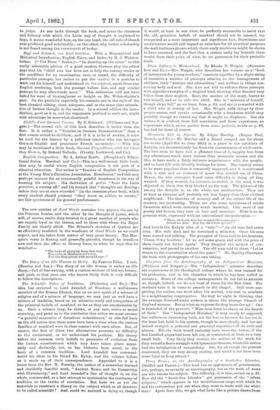The Scientific Value of Tradition. (Pickering and Co.)—The idea has
occurred to Lord Arundell of Wardour, a well-known member of the Roman Church, that as we now speak of a science of religion and of a science of language, we may just as well have a science of tradition, based on an attentive study and comparison of the primeval beliefs of mankind, so far as they are ascertainable by us. Such a science may, he thinks, at any rate, arrive at moral certainty, and point us to the conclusion that either we must assume "a parallel succession of fortuitous coincidences," or else fall back on the old notion that there must have been a time when the various families of mankind were in close contact with each other. But, of course, the first of these two alternatives presents no difficulty to the evolutionist, as we understand his position. His theory refers the common early beliefs to processes of evolution from the human consciousness which may have taken place separ- ately and distinctly, not, as has hitherto been usual, to the
• basis of a common tradition. Lord Artmdell has communi- cated his ideas to his friend Mr. Ryley, and the volume before us is made up of their correspondence. Appended to it is a letter from the Rev. H. Formby, the author of a somewhat learned and decidedly fanciful work, "Ancient Rome, and its Connection with Christianity," and Lord Arandell's line of thought is, on the whole, commended, as a fair attempt to systematise the testimony of tradition to the truths of revelation. But have we as yet the materials to construct a theory on the subject which at all deserves to be called scientific P And could we succeed in doing so, though it would, at least in our view, be perfectly reasonable to insist that the old, primitive beliefs of mankind should not be ignored, but recognised as a most important and significant fact, Darwinians and evolutionists would still regard as valueless for all practical purposes the multitudinous phases which these early traditions might be shown to have assumed, and the fact that a certain unity lay beneath them would, from their point of view, be no guarantee for their probable truth.














































 Previous page
Previous page